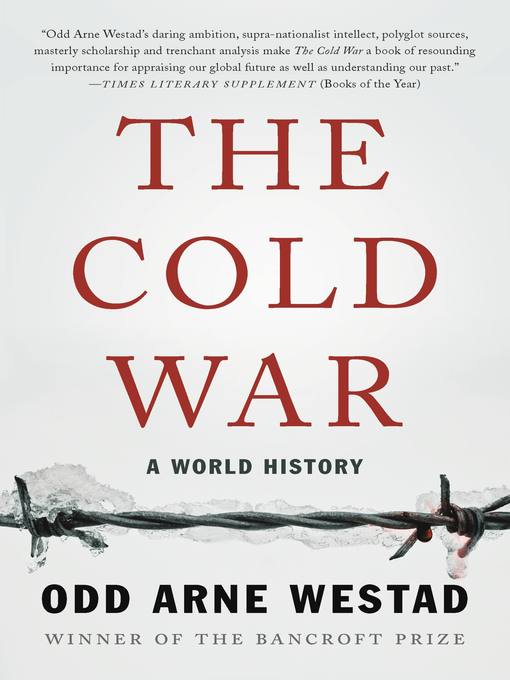
The Cold War
A World History
کتاب های مرتبط
- اطلاعات
- نقد و بررسی
- دیدگاه کاربران
نقد و بررسی

July 31, 2017
Westad (Restless Empire), professor of U.S.-Asia relations at Harvard, reassesses conventional frameworks of the Cold War and identifies its origins in the late 19th century with “the expansion of the United States and Russia as transcontinental empires” and “the sharpening of the ideological divide between capitalism and its critics.” Within this expansive structure, Westad traces the development of the epic global confrontation between capitalism and socialism “both as an ideological conflict and as an international system.” He ably synthesizes contemporary scholarship to produce an accessible narrative that provides a fresh perspective on the conflict’s pervasive global influence. This work covers the most prominent issues—the division of Europe, the wars in Korea and Vietnam, the showdown over Berlin, the arms race—and delineates the ways in which the Cold War influenced virtually all international developments, including European postwar reconstruction, decolonization, the Iraqi revolution of 1958, and the institution of military regimes in Latin America. Given the complexity of the era and the breadth of the approach, a single volume can only scratch the surface of the multitude of topics involved, but Westad’s panoramic history is nevertheless an impressive feat that will be appreciated by scholars, students, and general readers. Agent: Sarah Chalfant, Wylie Agency.

July 15, 2017
A sweeping study of the "bipolar" struggle between the two superpowers that moved from ideological conflict to permanent military confrontation.In astute, thematic chapters, Bancroft Award-winning historian Westad (U.S.-Asia Relations/Harvard Univ.; Restless Empire: China and the World Since 1750, 2012, etc.) offers an excellent sense of the ideological conflicts fulminating since the late 19th century that formed the crux of the Cold War. The forces of modernity that were rapidly and profoundly transforming society in Europe and America were also creating vast swaths of human misery, and socialism and communism rose to support "the ordinary men and women who were being thrown into capitalism's centrifuge." Proceeding chronologically, the author shows how these movements of workers joined other campaigns--e.g., women's rights and anti-colonialism--to present a challenge to the rise of American power in the 20th century. Thus the "sharpening of the ideological divide between capitalism and its critics" found its momentum from one world war to the next, as the U.S. strove to "make the world safe for democracy" at the same time Russia expanded in a different, revolutionary direction. Westad emphasizes that the generation that shaped the Cold War was the same caught in the nightmare of World War I, and both struggles contained the same elements: "fear, uncertainty, the need for something to believe in, and the demand to create a better world." This is an enormous story, and the author tackles it with admirable clarity and elegance, effectively laying out the positions of the two superpowers and their essential distrust of the other. From the "iron curtain" speech of Winston Churchill, "loss" of China to the Communists, tragedy of the Korean War, process of decolonization in Africa and Latin America, and the "age of Brezhnev" and Nixon in Beijing, Westad moves methodically through the stages of the Cold War. One of the essential themes is continually sounded: why, in the end, the Western model proved more attractive than that of the Soviets. A tremendous and timely history lesson for our age.
COPYRIGHT(2017) Kirkus Reviews, ALL RIGHTS RESERVED.

Starred review from June 15, 2017
Despite the plethora of current studies on the Cold War (1947-91), this hefty work by historian Westad (S.T. Lee Professor of U.S.-Asia Relations, Harvard Univ.) is worth the effort, explaining the background of the war and its continuing effects. Westad sets the U.S.-Soviet conflict within a global and longitudinal context, dating back to the 19th century. He provides insight into how the tensions impacted America's relationships with India, China, Cuba, and Vietnam, and others. Additional background is offered on the role of Russian politician Leonid Brezhnev as well as the detente, or brief period of improved relations between the U.S. and the Soviet Union in the 1970s. This significant history is told with verve and spirit. Although much of what Westad discusses is well known, such as how the Cold War affected Soviet leader Mikhail Gorbachev, the author's thorough analysis is essential for gaining a complete understanding of this multidecade and multination conflict. VERDICT An essential book for all collections and one of the best written so far on the Cold War. Westad's valuable work should spur more investigation on the subject.--Ed Goedeken, Iowa State Univ. Lib., Ames
Copyright 2017 Library Journal, LLC Used with permission.

























دیدگاه کاربران